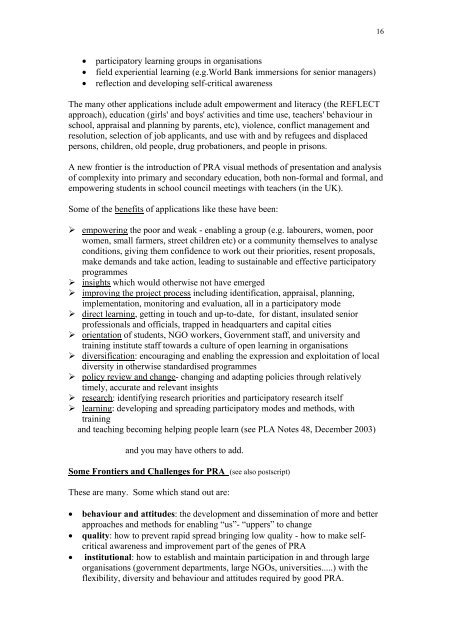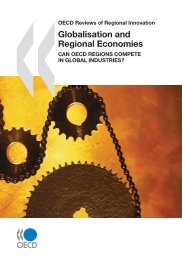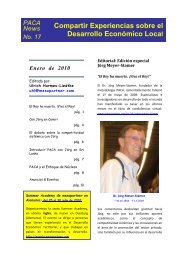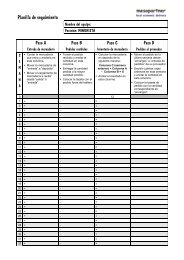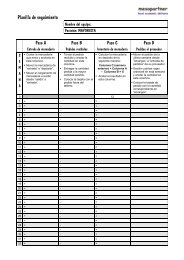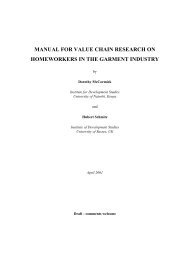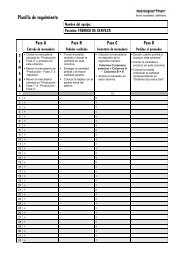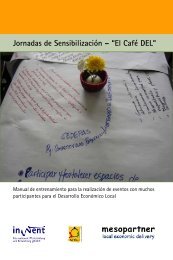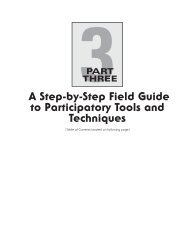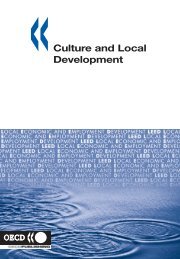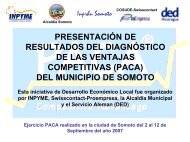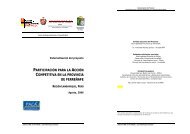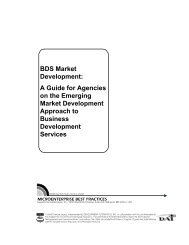R Chambers - Notes for participants in PRA-PLA course.pdf - PACA
R Chambers - Notes for participants in PRA-PLA course.pdf - PACA
R Chambers - Notes for participants in PRA-PLA course.pdf - PACA
You also want an ePaper? Increase the reach of your titles
YUMPU automatically turns print PDFs into web optimized ePapers that Google loves.
16<br />
• participatory learn<strong>in</strong>g groups <strong>in</strong> organisations<br />
• field experiential learn<strong>in</strong>g (e.g.World Bank immersions <strong>for</strong> senior managers)<br />
• reflection and develop<strong>in</strong>g self-critical awareness<br />
The many other applications <strong>in</strong>clude adult empowerment and literacy (the REFLECT<br />
approach), education (girls' and boys' activities and time use, teachers' behaviour <strong>in</strong><br />
school, appraisal and plann<strong>in</strong>g by parents, etc), violence, conflict management and<br />
resolution, selection of job applicants, and use with and by refugees and displaced<br />
persons, children, old people, drug probationers, and people <strong>in</strong> prisons.<br />
A new frontier is the <strong>in</strong>troduction of <strong>PRA</strong> visual methods of presentation and analysis<br />
of complexity <strong>in</strong>to primary and secondary education, both non-<strong>for</strong>mal and <strong>for</strong>mal, and<br />
empower<strong>in</strong>g students <strong>in</strong> school council meet<strong>in</strong>gs with teachers (<strong>in</strong> the UK).<br />
Some of the benefits of applications like these have been:<br />
‣ empower<strong>in</strong>g the poor and weak - enabl<strong>in</strong>g a group (e.g. labourers, women, poor<br />
women, small farmers, street children etc) or a community themselves to analyse<br />
conditions, giv<strong>in</strong>g them confidence to work out their priorities, resent proposals,<br />
make demands and take action, lead<strong>in</strong>g to susta<strong>in</strong>able and effective participatory<br />
programmes<br />
‣ <strong>in</strong>sights which would otherwise not have emerged<br />
‣ improv<strong>in</strong>g the project process <strong>in</strong>clud<strong>in</strong>g identification, appraisal, plann<strong>in</strong>g,<br />
implementation, monitor<strong>in</strong>g and evaluation, all <strong>in</strong> a participatory mode<br />
‣ direct learn<strong>in</strong>g, gett<strong>in</strong>g <strong>in</strong> touch and up-to-date, <strong>for</strong> distant, <strong>in</strong>sulated senior<br />
professionals and officials, trapped <strong>in</strong> headquarters and capital cities<br />
‣ orientation of students, NGO workers, Government staff, and university and<br />
tra<strong>in</strong><strong>in</strong>g <strong>in</strong>stitute staff towards a culture of open learn<strong>in</strong>g <strong>in</strong> organisations<br />
‣ diversification: encourag<strong>in</strong>g and enabl<strong>in</strong>g the expression and exploitation of local<br />
diversity <strong>in</strong> otherwise standardised programmes<br />
‣ policy review and change- chang<strong>in</strong>g and adapt<strong>in</strong>g policies through relatively<br />
timely, accurate and relevant <strong>in</strong>sights<br />
‣ research: identify<strong>in</strong>g research priorities and participatory research itself<br />
‣ learn<strong>in</strong>g: develop<strong>in</strong>g and spread<strong>in</strong>g participatory modes and methods, with<br />
tra<strong>in</strong><strong>in</strong>g<br />
and teach<strong>in</strong>g becom<strong>in</strong>g help<strong>in</strong>g people learn (see <strong>PLA</strong> <strong>Notes</strong> 48, December 2003)<br />
and you may have others to add.<br />
Some Frontiers and Challenges <strong>for</strong> <strong>PRA</strong> (see also postscript)<br />
These are many. Some which stand out are:<br />
• behaviour and attitudes: the development and dissem<strong>in</strong>ation of more and better<br />
approaches and methods <strong>for</strong> enabl<strong>in</strong>g “us”- “uppers” to change<br />
• quality: how to prevent rapid spread br<strong>in</strong>g<strong>in</strong>g low quality - how to make selfcritical<br />
awareness and improvement part of the genes of <strong>PRA</strong><br />
• <strong>in</strong>stitutional: how to establish and ma<strong>in</strong>ta<strong>in</strong> participation <strong>in</strong> and through large<br />
organisations (government departments, large NGOs, universities.....) with the<br />
flexibility, diversity and behaviour and attitudes required by good <strong>PRA</strong>.


